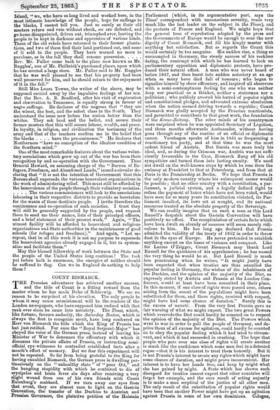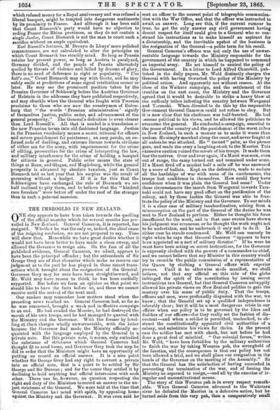COUNT BISMARCK.
THE Prussian adventurer has achieved another success, and the title of Count is a fitting reward from the master whom he has made Duke of Schleswig. We see no reason to be surprised at his elevation. The only people to whom it may cause astonishment will be the readers of the London newspapers, who have supposed him endued with that rank ever since he came into notoriety. The Times, which, like fortune, favours audacity, the Saturday Review, which is always the first to recognize merit, have long conferred on Herr von Bismarck the title which the King of Prussia has but just ratified. For once the "Royal Serjeant-Major " has obeyed the voice of the German press, instead of leaving his Minister of War to denounce the effrontery with which it discusses the private affairs of Prussia, or instructing semi- official eye-witnesses to contradict established facts after a month's effort of memory. But we fear this experiment will not be repeated. So far from being grateful to the King for having ennobled Bismarck, the German press is dwelling per- tinaciously on the "unhealthy state" of "poor Ott,' and the bungling stupidity with which he contrived to die of erysipelas and brain fever six days after receiving a very slight wound from one of his own friends with Count Eulenbnrg's scabbard. If we turn away our eyes from that event, they are almost sure to light on the Gastein Convention, the transfer of the Duchies to Austrian and Prussian Governors, the plaintive petition of the Holstein Parliament (which, in its argumentative part, says the Times' correspondent with unconscious severity, reads very mach like the last leader on the subject in the Times), and the protests of France and England. We might hope that the general tone of reprobation adopted by the press and the Governments of Europe would be enough to sour the new dignity of Count Bismarck, and fill his kingly master with anything but satisfaction. But as regards the Count this would certainly be too sanguine. His sudden rise, a thing so unexampled in Germany, the steady success of his reckless daring, the contempt with which he has learned to look on parliamentary opposition and diplomatic protests, have pro- duced their natural effect. A. man who was never heard of before 1847, and then burst into sudden notoriety at an age when so many have died full of honours ; who began to signalize himself by sheer effrontery, and inspired all observers with a semi-contemptuous feeling for one who was neither deep nor practical as a thinker, neither a statesman nor a politician ; who publicly avowed his hatred of popular rights and constitutional pledges, and advocated extreme absolutism when the nation seemed driving towards a republic ; Count Bismarck was gladly accepted by the Prussian reactioniste, and permitted to contribute to that great work, the foundation of the Kreuz-Zeitung. The sober minds of his countrymen were surprised when he was appointed Secretary of Legation, and three months afterwards Ambassador, without having gone through any of the routine of an ofoial or diplomatic career. Varnhagen speaks of him in 1851 as frequenting a reactionary tea party, and at that time he was the most ardent friend of Austria. But Russia was more truly his ideal, and, as during the Crimean war, Austria was not suffi- ciently favourable to the Czar, Bismarck flung off his old sympathies and turned them into lasting enmity. We need not dwell on the well-known steps by which he rose from the embassy at Frankfort to that at Petersburg, and from that at Paris to the Premiership at Berlin. We hope that Prussia is the only modern country where his subsequent career would be possible ; that no other country with a constitution, a par- liament, a judicial system, and a legally defined right to refuse the payment of taxes which have not been voted, would have seen for so many years its constitution violated, its Par- liament insulted, its laws set at naught, and its national resources treated as the absolute property of the Sovereign. We can readily imagine that on such a man as this Lord Russell's despatch about the Gastein Convention will have positively no effect. The recapitulation of certain facts which have been dwelt on already ad nauseam will seem merely ridi- culous to him. He has long ago declared that Prussia admitted the validity of the treaty of 1852 in order to throw dust in the eyes of Europe. He never pretended to establish anything except on the bases of violence and conquest. Like Sir Lucius O'Trigger, Count Bismarck may thank Lord Russell for the quickness of his apprehension ; he has named the very thing he would be at. But Lord Russell is much less penetrating when he writes, "It might justly have been expected that when treaties are thus annulled the popular feeling in Germany, the wishes of the inhabitants of the Duchies, and the opinion of the majority of the Diet, so expressly stated by Austria and Prussia at the London Con- ference, would at least have been consulted in their place. In this manner, if one class of rights were passed over, others arising from the assent of the populations might have been substituted for them, and these rights, received with respect, might have had some chance of duration." Surely this is the excess of naiveté. From the very first Prussia gave us fair warning of what we might expect. The two great Powers which overrode the Diet could hardly be counted on to respect the opinion of the majority of the Diet. The Powers which went to war in order to gull the people of Germany, and de- prive them of all excuse for agitation, could hardly be counted on to obey the popular feeling which it had tried to circum- vent, and which it had succeeded in crushing. The hope that people who pass over one class of rights will create another is much like the confidence which some men feel in a detected rogue—that it is his interest to treat them honestly. But it is not Prussia's interest to create any rights which might have some chance of duration, and might prove inconvenient. Her interest is to have her hands free, and keep by might what she has gained by might. A State which has shown each disregard for treaties cannot expect that other countries will forget her example, and the sure remit of acting unjustly is to make a man sceptical of the justice of all other men. The only result of the substitution of popular rights would have been that another Power might have got up an agitation against Prussia in some of her own dominions. Cologne, which refused money for a Royal anniversary and was refused a liberal banquet, might be tempted into dangerous sentiments by its proximity to France. And although it has been said that Count Bismarck's party would have no objection to ceding France the Rhine provinces, as they do not contain a single ,Tunker, Count Bismarck is not the man to court such a sacrifice without an ample equivalent.
Earl Russell's lectures, M. Drouyn de Lhuys' more polished remonstrances, are not calculated to alter the principles on which Count Bismarck has steadily acted. So long as Prussia retains her present power, so long as Austria is paralyzed, Germany divided, and the people of Prussia alternately quelled by threats of violence and lulled by dreams of glory, there is no need of deference to right or popularity. " Uns hlt's aus," Count Bionnarek may say with Gentz, and he may safely smile at predietions of some signal retribution sooner or later. He may• see the prominent position taken by the Prussian Governor of Schleswig before the Austrian Governor of Holstein in the addresses they have published respectively, and may chuckle when the General who fought with Twesten proclaims to those who are now the countrymen of Eulen- burg that " the words Prussian administration' signify of themselves justice, public order, and advancement of the general prosperity," The General's definition is even clearer than Lord Russell's. All that is needed is a translation el the new Prussian terms into old-fashioned language. iTustice in the Prussian vocabulary means a secret tribunal fur officers and severe pueishinent for pointsmen ; an easy, parole, an ell* toned code of duelling, and extreme licence towards civilians of either sex for the army, with imprisonment for the crime of editing, prosecution for the crime of interpreting the law, and military interference for the crime of holding a banquet for citizens in general. Public 'order means the state of things at Bonn, and Glogate and Magdeburg, While the general prosperity is advanced by absolute taxation, just as Count Bismarck told us last year that his surplus was the result of governing without a 'budget. If it is for this that the Idehleswigers have exchanged the rule of Dentnark we are half inclined to pity them, and to believe that the "kindred race forsaken" were better off under the roof of the stranger than in such a paternal mansion.































 Previous page
Previous page